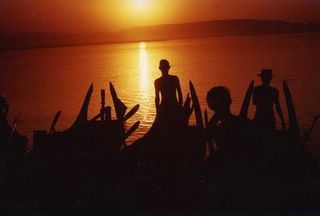
My Dad flew this Plane
My Dad (George Bigler Parkes) flew the plane above many times during his times in the United States Air Force, until the plane finally caught fire, all engines, and crashed into the Irish Sea in the mid-1950s. Everyone died except for my Dad and three other guys. He was deemed a survival expert and moved over to the USAF survival unit where he traveled and lectured for years about survival techniques from the Arctic to Panama.
In other news, always happy to recommend the sage advise coming from Tripso, where a small collection of travel writers and others in the industry continue to answer questions about the trials and tribulations of being a traveler. Not necessarily a travel writer, but it's close enough, and this site always rings true, plus there's an RSS feed for easy daily access.
Question: Recently, I booked airline tickets from Chicago to the Greek island of Crete online through Sam's Club. When I called to confirm my reservation, I was told that my flight had been canceled. A representative asked me to mail the old tickets back and we agreed to pick a new flight.
Although I was led to believe that we had made another reservation, something apparently went wrong with the transaction, and the booking didn't go through. I called Sam's later, when the tickets didn't arrive, and it turned out that my credit card number had been typed into the system incorrectly by one of its agents.
In the meantime, the price of the tickets had gone up $500 each. Sam's agreed to pay the difference and we settled on a new flight.
Problem solved? Not quite.
On my return flight on Aegean Airlines, I was told my tickets were "no good." If I wanted to catch a flight home, they said, I would have to stand in line and buy another ticket for about $300. The reason the tickets weren't valid? Sam's had printed the Aegean tickets on the wrong ticket stock, which made them unacceptable.
I'm trying to get my money back from Sam's for the extra ticket I had to buy, but so far, no luck. Can you help me?
Kathy Winters, Cottage Grove, Wis.
Answer: Wow, talk about the vacation from hell. It looks like almost everything related to your airline tickets went wrong: a cancellation, a booking that didn't go through and then a worthless ticket.
Although Sam's tried to make things right, it ultimately left you with a bill for $300. Then it stonewalled you when you asked for a refund.
Tripso Link






